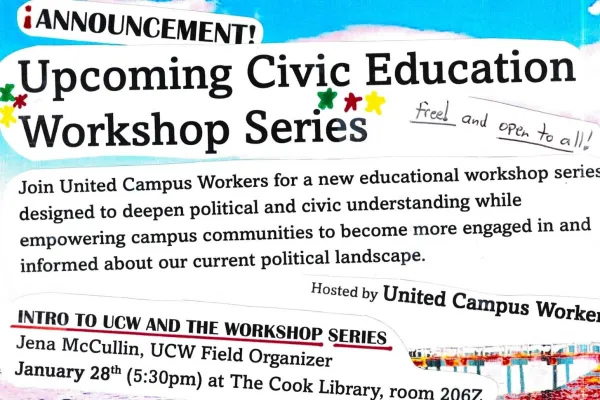Our Statement on Turning Point USA’s Event featuring JD Vance
During JD Vance’s appearance at the University of Mississippi, as part of the Turning Point USA Tour, the vice president presented a clear outline of his worldview: one of division, mistrust, and racial resentment. He lamented that economic inequality and young people’s inability to achieve the success of their parents is because of immigrants. He cited housing costs and wage decreases as examples of the problems created by immigration. Vance called for a homogeneous society—one that admits few immigrants and demands that those immigrants assimilate to white, Christian norms. He even attacked his own wife, who is Hindu, publicly expressing that he wants her to convert to Christianity. Vance urged the student attendees to get married and have children as soon as possible, yet he made no mention of affordable healthcare, support for childcare, or any policy that could help young families. In a sense, the America of JD Vance and Turning Point is a white Christian ethnostate that blames all of society’s problems on an arbitrary group, creating division between working Americans while offering no material solutions to improve people’s lives. All of this is in the service of billionaire benefactors who gain more wealth and power.
The vision of America that United Campus Workers sees contrasts sharply with Vance’s dystopian one. We support a diverse coalition of working Americans, united and fighting for the working class. While Vance simply blames immigrants for the skyrocketing cost of housing, we call out the real issues, such as private equity’s mass purchasing of houses and apartments as a speculative investment. We call for rent controls and subsidized affordable housing—policies that offer solutions. When Vance blames immigrants for the high cost of living, we retort that he is simply obfuscating the real issues to cover for his benefactors. Our high cost of living is a result of our current extreme levels of wealth inequality created by corporate greed. We support actual solutions, such as taxing the ultra-wealthy—how does our society benefit from individuals owning hundreds of billions of dollars? Higher taxes on these individuals—whose money was only made through their employee’s labor—can fix our broken healthcare system by funding Medicare for all, giving Americans who live in fear of medical emergencies and who are being driven to financial ruin from medical debt good healthcare and peace of mind. We see a united workforce—people of all ethnicities, religions, and cultures—working together to create a better society, one that allows everyone the opportunity to thrive.
This has been done before. The labor movement of the 1930s and 1940s was led by a diverse coalition of immigrants, African Americans, and white Americans. United, they successfully used their power to pressure Congress and the Roosevelt administration, achieving substantial gains such as the Fair Labor Standards Act of 1938—which gave us a minimum wage, the 40-hour work week, overtime, and child labor laws. They also effectively pushed for higher taxes on the rich, resulting in wealth being redistributed into society, facilitating the largest increase of wealth expansion in American history during the 1950s.
his week, millions of Americans will go without food, fall behind on rent, or be unable to afford basic necessities for themselves and their families because of a gap in SNAP benefits caused by the Republican government—and because 60% of Americans don’t even make enough to maintain a “minimal quality of life.” Meanwhile, Trump hosted a Gatsby-themed Halloween party at Mar-a-Lago, and his main priority is building a lavish ballroom at the White House, which is expected to cost hundreds of millions of dollars. Meanwhile, the wages of CEOs and the wealth of the world’s richest men (who had a front-row seat to Trump’s inauguration) continues to grow. This version of America is not predetermined. In fact, it is a choice. We have the power to change that, if we organize to scale. Americans have done it before, and it can be achieved again through unity.
In Solidarity,
UCW
Our Statement on Turning Point USA’s Event featuring JD Vance
UCW Joins Lawsuit Challenging the Constitutionality of New Anti-DEI Law, HB 1193


